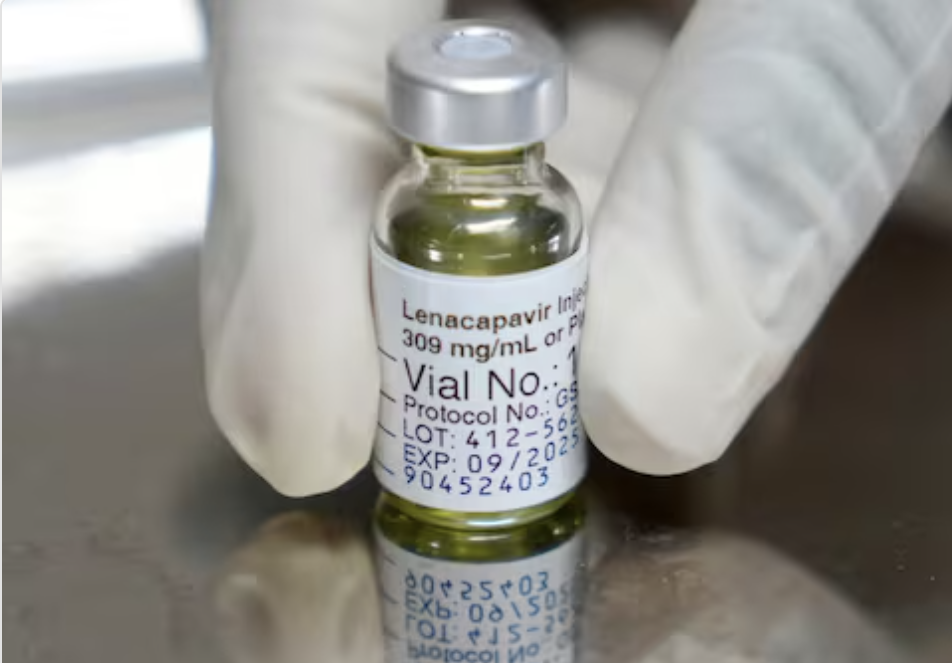Lenacapavir is given once in six months as an injection by a healthcare provider under the skin in the stomach area.
The Global Fund has announced that it signed an access
agreement with Gilead Sciences to procure lenacapavir, a twice-a-year injection
that has a 99 per cent success rate in preventing HIV infection.
The agreement will allow GF to provide the drug cheaply to the
countries that it currently supports.
Kenya is among the countries supported by GF, but how soon it
receives the new drug will depend on, among other factors, how fast the
Pharmacy and Poisons Board approves its use locally.
In October last year, the manufacturer, Gilead, had
announced that it was prioritising initial registration in 18 countries with
the highest HIV burden.
These are Botswana, Eswatini, Ethiopia, Kenya, Lesotho,
Malawi, Mozambique, Namibia, Nigeria, Philippines, Rwanda, South Africa,
Tanzania, Thailand, Uganda, Vietnam, Zambia and Zimbabwe.
Lenacapavir is given once in six months as an injection by a
healthcare provider under the skin in the stomach area.
As the first
twice-yearly, long-acting injectable for pre-exposure prophylaxis (PrEP),
lenacapavir expands the HIV prevention choice basket, offering a new option for
people who experience stigma, adherence challenges with existing PrEP tools, or
other barriers in their daily lives
“This is not just a scientific breakthrough — it’s a turning
point for HIV/Aids,” said Peter Sands, executive director of the Global Fund.
“For the first time, we have a tool that can fundamentally change the
trajectory of the HIV epidemic — but only if we get it to the people who need
it most. Our ambition is to reach two million people with long-acting PrEP. But
we can only do that if the world steps up with the resources required. This is
a pivotal moment — not just for the fight against Aids, but for the fundamental
principle that lifesaving innovations must reach those who need them most —
whoever they are, and wherever they live.”
Global Fund said the countries it supports, such as Kenya,
can access lenacapavir for PrEP. However, early access will be prioritised
based on HIV epidemiology, national prevention strategies, and available
resources.
GF said countries mostly in sub-Saharan Africa have
expressed strong interest in introducing lenacapavir for PrEP early and at
scale.
“Our ambition is to have the first shipment and delivery of
the products reaching at least one African country by the end of 2025, to mark
the beginning of a transformational shift in how HIV prevention is delivered to
communities with the highest burden of new infections,” Global Fund said in a
statement.
The urgency is particularly acute in countries like South
Africa, where adolescent girls and young women remain disproportionately
affected by HIV. “This is a game changer for South Africa,” said Dr. Aaron
Motsoaledi, Minister of Health of South Africa and co-host of the Global Fund’s
upcoming Eighth Replenishment.
“Lenacapavir offers
young women, and everyone at risk, a discreet, long-acting option to stay
HIV-free. For far too long, women and girls in our country have carried the
greatest burden of this epidemic. But scientific breakthroughs must be backed
by political will, community leadership, and sustained investment. We are
determined to ensure no one is left behind.”
Lenacapavir for PrEP is one of several essential tools in a
comprehensive HIV prevention strategy – alongside condoms, oral PrEP, voluntary
medical male circumcision, and other proven methods.
No single tool will end HIV on its own, but together, these
tools can help bend the curve toward ending the epidemic, GF said.
As the public health
landscape evolves, the Global Fund remains fully committed to helping countries
drive forward HIV prevention with long-acting PrEP. This includes focusing on
successful country implementation, ensuring that delivery is community-led,
culturally relevant, and sustainable, and demonstrating rapid early gains to
catalyze further adoption and scale.
To help accelerate access, the Global Fund is leveraging
private-sector donor funding to make the introduction and scale-up of
lenacapavir more affordable for the countries and communities it supports.
This financing
approach is further strengthened by catalytic investments, including the
support from the Children’s Investment Fund Foundation (CIFF). These efforts
ensure that the financial barriers to scaling this new tool are lowered as much
as possible, supporting countries to act quickly.
Achieving this ambition is made possible through a unique
coalition of partners providing vital technical assistance, policy guidance,
demand generation, and community mobilization. Key partners include the World
Health Organization (WHO), UNAIDS, the Gates Foundation, Unitaid, the Elton
John AIDS Foundation (EJAF), AVAC, and CIFF, each playing a critical role in
helping countries navigate introduction, accelerate regulatory pathways,
generate demand, and ensure community-led implementation from day one.


